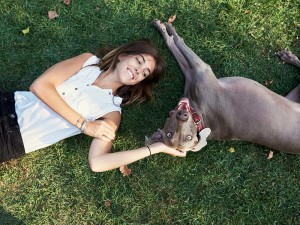The Healthiest Thing You Can Do Is Get a Dog, Harvard Report Says
Scientists confirm the myriad physical and psychological benefits of pet parenthood.

Share Article
If you live with a dog, chances are you’re familiar with the magical, stress-relieving power of a floofy pup. The calming wave of relief when burying your face in their fur after a difficult day at work is the best feeling ever.
To pet parents, the emotional, physical, and even spiritual benefits of canine relationships tend to be obvious. These benefits feel as real to us as the saliva-soaked tennis ball we’re holding in our hands. That’s why it can be so hard to understand why the non-dog world hasn’t caught on to all these life-altering advantages.
For the 2015 report “Get Healthy, Get a Dog,opens in new tab” Harvard Medical School (HMS) compiled hundreds of research studies from around the world that document the physical and psychological benefits of being a pet parent. Taken together, these studies, the results of which HMS reiterated in 2023opens in new tab, provide the most complete picture yet of the many ways in which dogs enrich human life: from improved cardiovascular health to companionship, defense against depression, and longer lifespans.
The science, according to Harvard
“The most common reaction we’ve been getting from people about this report is that they are so grateful that someone has finally put into print what they’ve known intuitively all along,” says medical editor Dr. Elizabeth Pegg Frates, president-elect at the American College of Lifestyle Medicine and director of lifestyle medicine and wellness, Massachussetts General Hospital Department of Surgery.

The 50-page report is the result of a collaboration between Harvard Medical School and Angell Animal Medical Center, a leading veterinary hospital based in Boston. “Get Healthy, Get a Dog” approaches the dog/human relationship as a two-way street: Half of it is devoted to the human — what the dog does for the person — and half is devoted to the dog — what the person should do for the dog.
Dr. Frates tackled the former, and Dr. Lisa Moses, a veterinarian, bioethicist, head of the pain management service at Angell Animal Medical Center, and scientist at the Broad Institute of MIT and Harvard, covered the latter, which includes sections on nutrition, exercise, and training.
Dr. Moses also makes a compelling case for adopting a dog rather than going to a breeder or pet store. “We didn’t want to create the impression that a dog is some kind of tool for achieving better health,” Dr. Moses says. “We wanted to emphasize that it’s the relationship that provides these benefits — it’s not the pet. And for that relationship to develop and be sustained, you have to do your part.”
Physical benefits of having a dog
Doing your part often means going for walks in the rain, sleet, or snow, at all hours of the day and night. In fact, one of the primary health benefits of being a pet parent is that it boosts your activity level.
There have been about a dozen studies conducted on the link between dogs and human exercise, including one that compared 536 pet parents with 380 non-pet parents. In the studies compiled in the report, people with dogs were found to be less likely to have chronic health conditions, such as high blood pressure and diabetes.
Exercise
A study in Missouriopens in new tab that paired public housing residents with certified therapy dogs for five 20-minute walks a week found that participants lost an average of 14.4 pounds without changing their diets.
Of course, the fact that regular exercise helps people get healthy isn’t exactly breaking news. The insights come from the critical role the dog plays as a fitness partner — offering everything from enthusiastic encouragement to relentless pestering for that walk outside.
“The dog support was always positive, while the human support could be positive (friends, family), negative (saboteurs) or inconsistent,” Dr. Frates writes.
Another reason that people tend to adhere to an exercise program if a dog is involved is the perception that the dog needs them. In one study, 72 percent of participants cited this as the reason they stuck to the activity schedule for the full 50 weeks of the trial.
“Sometimes, people find that the dog becomes the excuse for taking care of themselves,” Dr. Moses says. “It may not be acceptable to them to be so self-oriented, but if it’s about the dog, then it’s OK.”
Lower blood pressure and heart disease
It’s likely that increased exercise plus the calming effects of dogs (we’ll get to that later) contribute to lowering blood pressure. One study in the report actually tested pet parenthood as a treatment for high blood pressure. Thirty people with borderline hypertension were randomly assigned to either adopt a dog right away or defer adoption to a later date.
After five months, the segment of new pet parents experienced significant declines in systolic pressure (the top number, which measures the highest arterial blood pressure). The group that had been asked to defer adoption experienced these same declines once they had taken their new dogs home and spent time with them.
Fewer allergies
There is even evidence that exposure to a dog from infancy onward reduces the likelihood that even the most allergy-prone kids will develop problems. Only 19 percent of babies living with dogs developed pet allergies, compared to 33 percent of babies who grew up in dog-free homes, according to one study.
Science-backed statistics
Dog parents are more resilient when faced with stressful events, helping them avoid anxiety-related illnesses.
Pet parents over the age of 56 make fewer visits to their doctors than those without pets.
Pet parents have been found to suffer from fewer minor illnesses, such as headaches, colds, and hay fever.
Even the most highly stressed dog parents see their doctors 21 percent less than non-dog-parents.
Emotional benefits of having a dog
Beyond these formidable physical benefits are the psychological ones, which, per Dr. Frates, “are hard to overstate.” Dogs make us feel less isolated. They pull us into a social world inhabited by other people walking other dogs (70 percent of dog walks lead to at least one spoken interaction with a stranger).
And they help us meet the basic human need for companionship. Two large long-term studies that followed people from childhood to old age found that those who were more engaged with others — whether people or animals — lived longer. Those longer lives may also be more purposeful. A dog’s total dependency can make that person feel wanted and give life a sense of meaning.
Companionship and purpose
Dr. Moses knows this phenomenon first hand. Her grandfather spent more than a decade as the primary caretaker for his wife, who suffered from rheumatoid arthritis and cardiovascular disease. During all those years, he had a succession of dogs to care for — or was it the other way around?
After his wife died, his beloved Terrier mix succumbed to kidney failure. “At age 92, unbeknownst to us, he went out and adopted another dog,” Dr. Moses says. “Having a dog was the reason he got up in the morning. It was his entire life. He was a living testament to the power of the human/canine bond.”
Structure and self care
There are other indicators that dogs are particularly helpful to older people. The HMS report cites a year-long study from Canada that found elderly dog parents to be more capable of performing daily activities, such as dressing and feeding themselves.
This is likely because in attending to their pups, seniors are reminded to take care of themselves. They also have a structure in place, thanks to the need for regular pet meal times and walks, which reinforces their own self-care habits.
Bonding and socialization
At the other end of the age spectrum, children learn important life skills from early bonding with the family dog. That bonding can lead to stronger human connections later in life, according to a Tufts University study, which also found that kids who’ve forged emotional connections to dogs have more empathy, feel more self-assured, and do better in social settings.
“How else would you get your kids to touch and love something?” asks Dr. Frates, the mother of two teenage sons. “For boys, especially in this culture, there are very few acceptable ways of encouraging this type of bonding and intimacy.”
Stress relief
As those kids grow up, the dog benefits continue. Several psychological studies have found that college-age adults tend to find more stress relief in turning to their dogs than in seeking comfort from parents or siblings. Still, other adults were found to shake off the blues just by thinking about their dogs… which brings us to the magic of oxytocin.
Canine Rx
Having a dog can be like having your own prescription for oxytocin with unlimited refills — except that rather than dispensing this drug, your dog incites you to release it. Also known as the “love,” “bliss,” and “bonding” hormone, oxytocin inspires positive feelings. It helps stave off depression and limit the release of the stress hormone cortisol. You can get an oxytocin infusion by petting your dog, by laughing at the silly things they do, and even by looking into their loving eyes, a conclusion confirmed by studies.
Dogs also offer an alternative to meditation sessions and yoga classes when it comes to learning the Buddhist practice of mindfulness. Every dog walk is typically an exercise in experiencing the present moment: savoring an especially aromatic fire hydrant, having a satisfying roll in the grass or interacting with a new neighbor. Dogs put us more in touch with nature and help us put aside our worries about the future and regrets about the past to focus on the here and now.
Dr. Moses hopes readers will follow the report’s suggestions and reap the amazing health benefits of being a pet parent. “Dogs are more important now than ever before,” she says. “Because people are living longer and so many live alone and don’t have kids. This is the moment for the human-animal bond.”
Research:
Twig Mowatt
Twig Mowatt covered the drug war in Colombia for the New York Times and the Associated Press and now writes about animal issues. She works closely with dog rescue organizations in Puerto Rico and with GREY2K USA.
Related articles
![Woman lying in bed with two golden retrievers]()
13 Reasons You Should Let Your Dog Sleep in Your Bed
It’s science (and adorable).
![Woman laying on the grass smiling at her dog]()
10 Ways You Can Make Your Dog’s Life Better
Number 6 will probably surprise you.
![Person holding a corgi, shot from behind]()
Flying with An Emotional Support Animal
Are ESA alpacas and peacocks mocking people with real disorders? A service-dog owner and flight attendant get real.
![A woman with black hair surrounded by cats cuddling her]()
6 Science-Backed Ways Being a Pet Parent Improves Your Health
They say laughter is the best medicine, but so is a pet (especially one who makes you laugh).
![A woman walking with her dog in a garden.]()
How to Take Your Dog On a Mindful Nature Walk
Wellness experts and animal trainers agree: A tuned-in outdoor outing can be restorative for both people and pets.
![]()
5 Places Where Therapy Dogs Do Their Best Work
At airports, hospitals, schools, and more, therapy dogs make things better.









